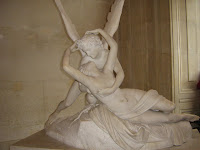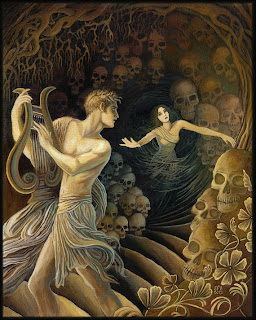Love in Greek Mythology
Do you like this story?
Eros and Psyche
Psyche was the daughter of an unknown king. Her beauty was so extraordinary that men would worship her instead of courting her. Aphrodite then, out of jealousy for her beauty, sent Eros to make Psyche fall in love with some unworthy man while an oracle said that Psyche must wed a horrible monster on the top of a mountain. Psyche then was first exposed, and then carried by the wind to a castle. But Eros, instead of obeying Aphrodite, fell in love with Psyche and visited her every night, although never allowing Psyche to see him.
"Whoever judges not Eros to be a mighty god is either stupid or, having no experience of good things, knows not of the god who is the mightiest power to men." (Euripides, quoted by Athenaeus, Deipnosophistae 13.600).
However, following the advices dictated by jealousy that her two sisters gave her, Psyche managed to know who her lover was. Eros then deserted her, and when their love was discovered, Psyche suffered the wrath of Aphrodite, who mistreated her in many ways. However, having surpassed several difficulties, the lovers could reunite, and Psyche was reconciled with Aphrodite, and made immortal.
Orpheus and Eurydice
The story of Orpheus and Eurydice is beautiful but tragic.
Orpheus is known as the most talented music player of the ancient times. It is said that god Apollo was his father, from whom took his extreme talent in music, and the Muse Calliope was his mother. He was living in Thrace, on the northeastern part of Greece. Orpheus possessed a divinely gifted voice that could charm everyone who heard it. When he was presented first the lyre as a boy, he had it mastered in no time at all. The myth says that no god or mortal could resist his music and even the rocks and trees would move themselves to be near him.
Eurydice, in greek mythology, was an oak nymph or one of the daughters of Apollo (the god of light). She was the wife of Orpheus, who tried to bring her back from the dead with his enchanting music.
When he first met and how he wooed the maiden he loved, Euridice, we are not told, but it is clear that no maiden he wanted could have resisted the power of his song. They were married, but their joy was brief. Directly after the wedding, as the bride walked in a meadow with her bridesmaids, a viper stung her and she died. Orpheus' grief was overwhelming. He could not endure it. He determined to go to the underworld and try to bring Eurydice back.
In another version of the story, Aristaeus, a shepherd, had plotted a plan to conquer the beautiful nymph. And there he was, waiting in the bushes for the young couple to pass by. Seeing that the lovers were approaching, he intended to jump on them and kill Orpheus. As the shepherd made his move, Orpheus grabbed Eurydice by the hand and started running pell-mell through the forest. The chase was long and Aristaeus showed no signs of giving up or slowing down. On and on they ran and suddenly, Orpheus felt Eurydice stumble and fall, her hand slipping from his grasp. Unable to comprehend what had just happened, he rushed to her side but stopped short in dismay, for his eyes perceived the deathly pallor that suffused her cheeks. Looking around, he saw no trace of the shepherd for Aristaeus had witnessed the event and had left. A hand’s reach away, Eurydice had stepped on a nest of snakes and had been bitten by a deadly viper. Knowing that there was no chance of survival, Aristaeus had abandoned his try, cursing his luck and Orpheus.
He dared more than any other man ever dared for his love. He took the
fearsome journey to the underworld. There he struck his lyre, and at the
sound all that vast multitude were charmed to stillness.
He played his lyre and sang out to Hades and Persephone that Eurydice was returned to him, but upon one condition: that
he would not look back at her as she followed him, until they had reached
the upper world. So the two passed through the great doors of Hades to
the path which would take them out of the darkness, climbing up and up.
He knew that she must be just behind him, but he longed unutterably to
give one glance to make sure. But now they were almost there, the blackness
was turning gray; now he had stepped out joyfully into the daylight. Then
he turned to her. It was too soon; she was still in the cavern. He saw
her in the dim light, and he held out his arms to clasp her; but on the
instant she was gone. She had slipped back into the darkness. Waves of anguish and despair swept over him and shuddering with grief
he approached the Underworld again but this time, he was denied entry,
the gates were standing shut and god Hermes, sent by Zeus, wouldn't
let him in.
From then on, the heart-broken musician was wandering disoriented, day after day, night after night, in total despair. He could find no consolation in anything. His misfortune tormented him, forcing him to abstain from contact with any other woman and slowly but surely he found himself shunning their company completely. His songs were no more joyful but extremely sad. His only comfort was to lay on a huge rock and feel the caress of the breeze, his only vision were the open skies. And so it was that a group of irate women, furious for his scorn towards them, chanced upon him. Orpheus was so desperate that he did not even try to repulse their advances. The women killed him, cut his body into pieces and threw them and his lyre into a river. It is said that his head and his lyre floated downriver to the island of Lesvos. There the Muses found them and gave Orpheus a proper burial ceremony. People believed that his grave emanated music, plaintive yet beautiful. His soul descended down to Hades where he was finally reunited with his beloved Eurydice.
Subscribe to:
Post Comments (Atom)






0 Responses to “Love in Greek Mythology”
Post a Comment